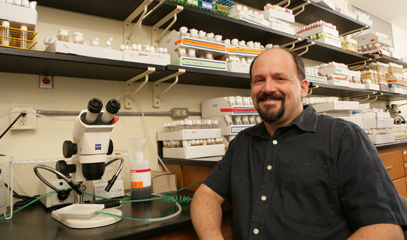
By Rolando Garcia
Natural Sciences and Mathematics
Three years ago a University of Houston biologist published findings suggesting that smelling food could have the same unhealthy affect as eating it – now he has pinpointed at least one particular odor behind this strange phenomena.
Scientists have long known that restricted calorie intake extends the lifespan of all sorts of organisms, from flies to mice to primates. Tests also have shown it can improve health in humans. However, a team of researchers including Gregg Roman, assistant professor of biology at UH, found that – in fruit flies – smelling food odors reduced the longevity benefit of a calorie-restricted diet. Two groups of flies were given the same low-calorie diet but the group that had its olfactory function knocked out lived longer.
Now the team, led by Scott Pletcher, an associate professor at the University of Michigan, reports in a recent issue of the PLoS Biology journal t hat they have located a specific odor that is reducing the fruit flies’ lifespan.
Researchers compared two groups of fruit flies similar in every way, including diet, except that in one group the Gr63a receptor which enables them to smell carbon dioxide was eliminated. These mutant flies lived up to 30 percent longer.
Yeast – a food for fruit flies – gives off carbon dioxide so it is believed that the CO2 odor acts as a food cue to flies, Roman said. In addition to living longer, those that could not smell carbon dioxide exhibited healthy traits such as increased fat storage – which indicates a slower metabolism and conservation of nutritional supplies – he added.
For fruit flies, carbon dioxide also signals stress so it is possible that the reduced stress also contributes to the longer lives of the Gr63a receptor mutants.
Because fruit flies only live an average of six to seven weeks, they are ideal for longevity studies, Roman said. Also, the metabolic process is similar at the cellular level for all organisms, so studies of fruit flies might have implications for humans.
|

